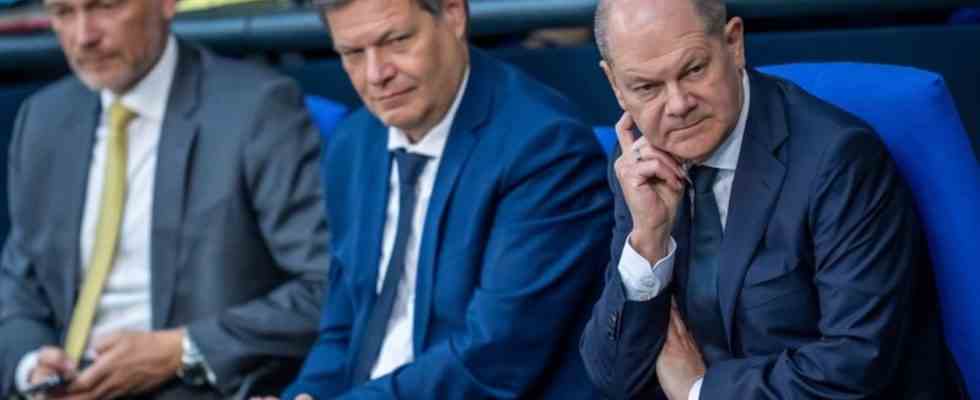federal government
Appeals and confidence: coalition before the top meeting
Chancellor Olaf Scholz (SPD) with his ministers Robert Habeck (Greens) and Christian Lindner (FDP). Can the points of contention in the traffic light coalition be settled? photo
© Michael Kappeler/dpa
There has been an argument in the traffic lights for weeks, tomorrow the top people will sit down together. Do the three partners approach each other beforehand?
Shortly before the coalition meeting on Sunday on a number of issues, the three traffic light parties defended their positions – and appealed to the other to think of the common whole.
Transport Minister Volker Wissing from the FDP told the “Neue Osnabrücker Zeitung” with regard to the motorway expansion: “There should actually be a consensus that the approval procedures for many infrastructure projects should be accelerated: I hope the Greens give up their blockade attitude.” Greens leader Ricarda Lang, on the other hand, said on Friday evening at a state party conference in Bautzen, Saxony, that when it comes to climate protection, you have to get away from the mode that only one party makes suggestions and many others just say how it doesn’t work.
FDP General Secretary Bijan Djir-Sarai insisted, however, that citizens should not be burdened any further, “neither with tax increases nor with a hasty ban on oil and gas heating”. He told the German Press Agency: “Climate protection policy must be open to technology and take people and business with us so that we can achieve climate neutrality without increasing polarization of society.”
Compromise appeals and confidence
Others demonstrated greater confidence ahead of the coalition meeting. The parliamentary secretary of the SPD, Katja Mast, advised more self-confidence in one’s own ability to compromise. “It’s important to emphasize what we have in common and not what separates us. And it’s worth looking at what we’ve already done together,” she told the editorial network Germany.
The co-leader of the Greens, Omid Nouripour, found that the coalition had always found common solutions for the benefit of the country. “And I am confident that we will also come to an agreement on the current issues. People rightly expect that we will cut the knots soon,” he told the Düsseldorf “Rheinische Post”.
For weeks there have been sometimes heated discussions in the coalition about motorway expansion, climate protection in the transport sector, heating replacement and the upcoming budget for 2024. It is uncertain whether top representatives of the traffic light parties will find agreements in the coalition committee on Sunday.
quarrel about the household
Juso chairwoman Jessica Rosenthal finds this a priority. “I expect that the chairmen of the traffic light parties, the Chancellor and the heads of the parliamentary groups will come to clear agreements in the event of smoldering conflicts,” she told the Düsseldorf “Rheinische Post”. She demanded that the budget dispute be discussed on Sunday. “The coalition committee offers a good forum for the basic clarification of how we finance projects such as basic child security, the BaföG reform and many other reform projects of the coalition agreement.”
Djir-Sarai insisted on discipline in this regard: “All coalition parties must recognize the current financial realities. This includes compliance with the debt brake and prioritizing government spending,” he told the dpa. Likewise, FDP deputy faction leader Christoph Meyer: “We are stopping the unbridled spending addiction of the SPD and Greens and are now helping with cold turkey,” he told the newspapers of the Funke media group. “Sometimes you have to knock the bottle of liquor off the mouth of an alcoholic.”
Road construction advocates also in the SPD
Unlike the Greens, the transport policy spokeswoman for the SPD parliamentary group, Dorothee Martin, emphasized the importance of road construction projects for Germany as a business location. The focus is shifting to more climate-friendly modes of transport, she told the Bayern media group. But: “The important goal of modal shift must not be pursued at the expense of the industrial nation of Germany.” Like the FDP, Martin advocated prioritizing road projects. The Greens reject planning acceleration for roads.
BDI President Siegfried Russwurm also called for accelerated road construction. “The industry expects that the coalition committee will finally adopt the propagated Germany pace for planning and approval procedures,” he told the Funke newspapers. Roads will remain by far the main mode of transport until 2050.

